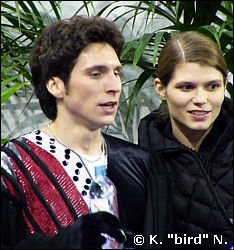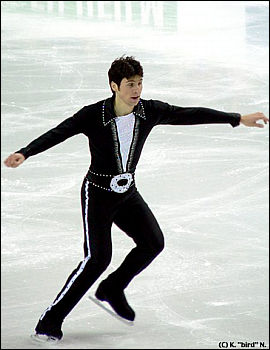"The only important thing is to
improve"
- A chat with Gheorge Chiper
Part I
by Helga Dobor
photos © K.
"bird" N. & Helga
Dobor
The 2004/05 season was a good one
for Gheorghe. He became the Romanian champion for the
7th straight time, and things were finally coming together. |
 |
Gheorghe: Test 1-2, 1-2
Does it work? :)
How did you start skating?
Gheorghe: We had skating in the family so it felt natural
for me to start too.
What were the circumstances like then?
Gheorghe: When I see children skate today, I remember how
it was when I was young. It was different and more difficult.
We practiced every morning before school. We had no other
option as no other time was available. But if you want to
better your results and reach your goals, this is the time
to start thinking about changes. You cannot reach the top
ten at Europeans with practices only at 6 in the morning.
This is still the problem with skating in Romania. We don’t
have many skaters, and there is little motivation for the
coaches. They see no reason to coach children when there’s
so little ice time, and as you can see, the junior skaters
are few – only a few skaters are still in the country.
You have trained at summer camps under Mishin in
Jaca (Spain) and also in Flims (Switzerland) with Kudriavtsev.
What is the difference between their styles?
Gheorghe: I didn’t spent so much time in Flims, only
a few days, but I was in Jaca about 3 weeks. I had been working
with Mishin for a while, but you have to make choices and
take advantage of what is made available to you. People say
that Mishin and Kudriavtsev are very different in their work,
but for me one doesn’t rule out the other. You have
to choose what is best for you - both from Mishin and from
Kudriavtsev; you have to find a balance. There isn't too much
training in the summer – only maybe a month out of the
12 in a year! The main practice is at home, whereas in the
summer you get only ideas and technical help. I don’t
think it's a problem that I work with Kudriavtsev, or with
Mishin, or with any other coach. If something useful is offered
to me, I’ll take it.
Do you like the Russian style?
Gheorghe: Yes, but I don’t want to follow any one style.
I want to do a better job myself. Things have to grow and
it's not important where the ideas originate from, or from
where the help comes. The only important thing is to improve.
Russian style or American, French or Italian - it doesn’t
matter.
Does it make a big difference living and training
in Switzerland?
Gheorghe: It’s safe to say that the life I live in Switzerland
and the life I lived in Romania differ greatly. In Romania,
I went to school and then to the University. In Switzerland
I don’t study, I work and I have my family. The lifestyle
is very different, you cannot even compare it! In Switzerland
there are more opportunities, better rinks, better ice…
everything is better! But of course everything depends on
how you use your opportunities. Even with less opportunity
you can get good results, just like you could have all the
opportunities in the world be useless if you didn't make the
most of them.
I work with professional people, so all my costs are higher,
which is tough. In Romania it would be cheaper, but it comes
back to the skater deciding what goals he wants to reach in
life. If you want to reach higher, you have to accept that
it will be harder - you will need more money and it will take
more time.
Do you feel lucky to live and
train in Switzerland? |
 |
What is your connection with the Swiss skaters?
Gheorghe: I meet the coaches frequently when I go with the
children to competitions. When we meet we always talk. Sometimes
we practice in the same rink, like with Sarah Meier and with
some other German-speaking Swiss (not with the French-speaking
Swiss as they live in another part of the country). We have
a good relationship.
You are coached by your wife Sandra. How does it
work to have her as a coach at the rink, and as a wife at
home?
Gheorghe: It’s not so easy. It can be difficult to set
the boundaries between coach and wife. But this is our situation,
we are a family. It has worked well so far and it keeps getting
better and better.
What are the advantages and disadvantages?
Gheorghe: Hmm... If something goes bad it’s hard to
say “Ok, that’s it, I’m going home! I don’t
want to see my coach for a while, and I will forget everything!”
It is different with a coach you only meet on the ice. If
he says,” let's do this or that”, I can easily
answer: "Ok". But Sandra and I are together the
whole day, and we talk and think, do this and this... of course
sometimes we argue, but again, this is our situation. And
there are good things too. We know each other very well, and
when she tells me, in practice or competition, that something
wasn’t so good, it’s no big deal because we know
this result is ok for me - we’ll go on and things will
get better. Sandra’s a very good psychologist and gives
me great support. I cannot imagine working permanently with
another coach when we work so well together.
Sandra is also your choreographer. What is your input
in the choreography of programs?
Gheorghe: Sandra chooses the music – and usually I don’t
like it... “No, no, that’s not a good idea!”
Some days or weeks later I realize that it isn’t such
a bad idea. So we start working on it, and again “No,
no, it’s a very bad idea”. This can continue for
a while. Making a program is a very slow process for me. *
laughs* I’m too critical because I’m a perfectionist.
Usually, she will outline a piece with the basics, and from
there she can put in new elements and sometimes take them
out again. It all depends on the jumps - if I do them well
or not. Normally, you work 1-2 months with the moves and then
comes the choreographer and says: “It is not good, throw
it out and put a new element in!” and there’s
a lot of debating back and forth. So this is another advantage
that my wife is my choreographer as well as coach. She always
sees what’s good and bad, and whether a mistake is a
permanent one or only something temporary. If you work with
a choreographer for only 2-3 weeks, and then don’t see
him/her for a month, and then you work together again for
maybe a week, you can’t expect so much. Our work is
constant and continuous. My programs get better and better,
competition for competition, not only technically, but we
make changes in the choreography too. We change the music,
edited it, we take out and put in moves, and we always analyze
- if something is bad we change it. A program is a process
and we talk about everything. If I have an idea I always tell
her, and we think about whether we can use it or not. If we
can she tries to fit it in somewhere.
Do you make the changes during
competitions? |
 |
Placing 8th is your best result at any Europeans.
Are you satisfied?
Gheorghe: You can always expect more, but you can expect less
too. Now we have the new judging system and that’s why
it was more difficult. For example, it’s harder to see
where exactly you stand. It’s very easy to lose places,
and harder to advance. For me skating well and presenting
a good program is more important than my final placement.
That only comes second.
Do you feel you skated your programs well?
Gheorghe: Yes, I think so. Everybody made mistakes so it was
up to me to make fewer mistakes than the others, right? I
made two mistakes in my short program. These shouldn’t
have been there, but overall I am satisfied with my performances.
How much does the audience affect you? Is it important
that they enjoy the programs? Are you aware of the audience?
Gheorghe: If they are clapping from the first minute it isn’t
too interesting, I think.
If you just skate along in the same tempo, and the audience
has to clap continuously – hmm... I don't think it’s
a good program. Usually when the audience claps for you, it’s
easier to skate, you feel better on the ice, but in the first
moments it’s important to concentrate on what you’re
doing. Perhaps the audience will like you, perhaps not. If
they like it, it’s a great feeling, but if not –
ok, and that’s that! I think it’s more important
for a skater to be satisfied with himself. If the audience
likes it too, that’s a bonus. At Europeans nobody asks:
“Hey, who was the most popular?” but they do ask:
“Who won the Championship?”
In eligible skating it’s only important to win the competition.
And you win with or without the approval of the audience.
If you’re a professional skater the audience must love
what you do on the ice since your job depends on it. I think
perhaps a compromise would be the best. When the audience
likes you and you feel satisfied, that is the best!

Especially if you win...
Gheorghe: Well, you don't have to win, you can place 8th and still be satisfied! * smiles*



